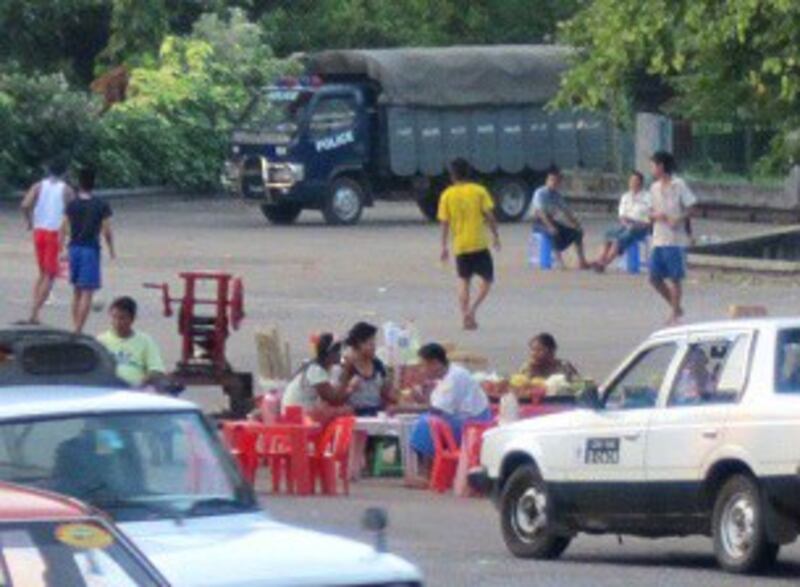The party backed by Burma's ruling military junta has, asexpected, taken the lead in the country's first elections in two decades, theofficial Election Commission announced after poorly attended polls at theweekend.
As results trickled in, the opposition charged vote fraudbut claimed it had won in key areas in the former capital Rangoon and inMandalay city, where anti-junta feelings are believed to be running high. Minority ethnic parties also grabbed several seats.
Western powers condemned the Nov. 7 polls as a sham asindependent monitors were barred from observing the process and no foreignmedia were allowed to cover the landmark event.
The junta's political proxy, the Union Solidarity andDevelopment Party (USDP), which is widely tipped to win the elections due torules in its favor, has amassed 43 of the 59 seats declared so far, accordingto the Union Election Commission hours after polling stations closed.
The remaining 16 seats were captured by ethnic minorityparties, the commission said.
The USDP did not contest in many ethnic minority strongholdswhere it was said to have little chance of winning.
The largest opposition party, the National Democratic Force(NDF), claimed it had won six seats in the Rangoon area and five in Mandalaywhile the ethnic Rakhine National Development Party (RNDP) said it had won sixseats in the northern Rakhine State.
Possible cheating
NDF, an offshoot of detained opposition leader Aung San SuuKyi's National League for Democracy (NLD), contested only 164 seats in totalbut complained that its winning chances could be marred by possible cheating bythe military-backed USDP.
NDF leaders said USDP had amassed "advance" ballots which they linked to the headquarters of the junta.
Khin Maung Swe, an NDF founder, said that in one of the keycontests, some 4,000 advance votes had been chalked up by USDP's Aung TheinLin, a former major general and current Rangoon city mayor.
The back of the advance ballots had “Nay Pyi Daw”printed on them, referring to the junta's new capital,Naypyidaw, Khin said.
"We have complained to the election commission, and theyare trying to sort this out," he said.
In another seat in the Rangoon area, the election commission suspended polling after protests by another military-linked party.
The National Unity Party (NUP), which is the successor tothe late dictator Ne Win's party, accused the USDP of openly campaigning in apolling booth against election laws.
Many contests were direct fights between the USDP and NUP, which between them make up nearly 70 percent of the election candidates.
The USDP fielded 1,112 candidates for the 1,159 seats in thetwo-house national parliament and 14 regional parliaments while the NUP had 995candidates.
More than 29 million people were eligible to vote, butturnout was very low in the estimated 40,000 polling stations across Burma thatwere opened for 10 hours, according to sources, eyewitnesses, and reports.

Ridiculous election
"This is a really very ridiculous election," saidThakhin Chan Tun, a key member of pro-democracy Veteran Politicians Group,pointing to the poor turnout.
Thakhin, a member of parliament in the 1950s as well asformer Burmese ambassador to China, said the voter turnout in his area was"so low."
"But I went and voted."
Security was tight during polling as riot police weredeployed at key road junctions amid rumors of trouble. But the voting was mostlypeaceful.
In the last elections in 1990, Nobel Peace Prize winner SuuKyi swept her party to victory, but the result was never recognized by the rulinggenerals. She has been detained for most of the last 20 years and supported aboycott of Sunday's election.
The United States and the European Union led the chorus ofcondemnations of the polls.
U.S. President Barack Obama, on a visit to India, said thevote would be "anything but free and fair" and lamented that"for too long the people of Burma have been denied the right to determinetheir own destiny."
His chief diplomat, Secretary of State Hillary Clinton, saidthe U.S. administration would still speak to the military leaders but maintain"rigorous sanctions" against them while they hold politicalprisoners, abuse human rights, and ignore dialogue with the opposition.
"The generals who have ruled the country for the past22 years missed an opportunity to begin [a] genuine transition toward democraticgovernance and national reconciliation," Clinton said.
The European Union's foreign policy chief Catherine Ashtonalso dismissed the election and called for the release of political prisoners.
Elections "not compatible" with international standards
"Many aspects of these elections are not compatiblewith internationally accepted standards, notably in the bias against mostopposition parties—such as the NLD—and their candidates," saidAshton.
Britain said the election would "mean the return topower of a brutal regime."
Some however saw the polls as a small step towards democracyas opposition parties will have a voice in parliament.
"Even a sham election can provide a small opportunityto contribute to change in Burma," said an editorial in Irrawaddy, awebsite run by exiled Burmese journalists, ahead of the elections.
"Change will come to Burma not because of a shamelection but because of the people’s inspiration," it said.
"Now is the time to shake up Burma’s militarydictatorship and politics of stalemate."
The junta refused to allow international monitors or foreignmedia into the country for the election, and local journalists were only takenon "guided" tours. Western foreign diplomats refused to join thesetours.
A Japanese journalist with the Tokyo-based video and photoagency APF News was detained in the southeastern border town of Myawaddy aftercrossing over illegally from Thailand, a Myanmar government official said.
Ethnic Karen rebels are believed to have seized the police station and post office of Myawaddy on the election day to protest the election, border sources said.
The junta has indicated that Suu Kyi may be freed after thepoll. She is among about 2,200 political prisoners in the tightly ruled state.
Reported by Kyaw Kyaw Aung, Nyan Win Aung, Tin Aung Khine, Nay Rain Kyaw, Thein Aung and Kyaw Min Htun for RFA's Burmese Service. Translated by Kyaw Min Htun and Khin Maung Nyane. Written in English by Parameswaran Ponnudurai.
